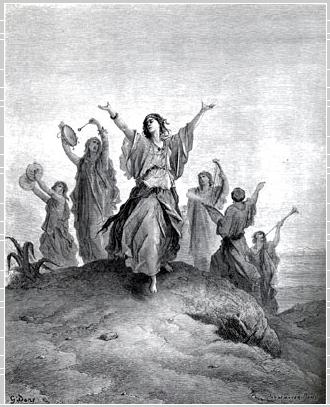
Have you ever read something and believed that it merited further thought, but the ideas in it were just too horrific for deeper consideration? Earlier this year I read such a story in Judges 11 concerning a man named Jephthah who makes a rash vow. I considered writing an article about it at that time, but just couldn't do it. Recently I was reading Proverbs 20:25 which says, "It is a trap for a man to say rashly, 'It is holy!' And after the vows to make inquiry." When I read these words, this story came back to haunt me, and I just couldn't let it go this time. In this blog, I'll first briefly summarize this chapter then discuss how these ideas apply to us.
Jephthah was a Gileadite and a valiant warrior (Judges 11:1). Immediately following the mention of his valor in battle, the scripture says, "but he was the son of a harlot." He was forced from his homeland due to his illegitimacy, but after a time of separation, the very people that had forced him away invited him back to be chief over them to fight against the Ammonites (Judges 11:1, 2, 9-11).
He agreed to do this, and petitioned the Lord before going up to fight the enemy. He asked God to give their adversaries into his hand and made a vow that he would regret the rest of his life. He said, "If you will indeed give the sons of Ammon into my hand, then it shall be that whatever comes out of the doors of my house to meet me when I return in peace from the sons of Ammon, it shall be the Lord's, and I will offer it up as a burnt offering" (Judges 11:30-31). I can't help but wonder what he possibly could have thought that he might be sacrificing: a favorite family dog, one of his servants? Judging from his response of tearing his clothes and telling his daughter that she brought him very low when she sprinted through the door celebrating his victory, he obviously hadn't considered the possibility that he might be promising to sacrifice his only child (Judges 11:34-35).
Although the story is a horrible one, we find a beautiful example of obedience in it. When Jephthah reveals his oath to his daughter, she responds with complete submission. She tells her father, "You have given your word to the Lord; do to me as you have said" (Judges 11:36). At such a young age, she realizes the importance of keeping one's word to God. This wasn't even her own integrity that we are talking about. I can't even manage to keep my word to God on such simple matters as spending time with him in prayer or reading his word.
In considering how to apply this story to our lives, I think it is important to look at Jephthah's motivation behind making this foolhardy promise before considering the possible implications. Having formerly worked as a school counselor, I couldn't help but think that his rash vow was related to his feelings of rejection from being the child of a prostitute and having been rejected by his peers earlier in life. Suddenly he feels that here is his chance to fit in. If he can simply lead his brothers to victory, he will finally have a place among them. He does not stop to consider what his vow might require, he is only thinking of how victory would finally give him a place of honor among his kinsmen. Once he made this tragic promise, he felt that he had to keep his word to God.
As I considered his actions, I couldn't help but think about the present. Many women have baggage from the past, perhaps from previous abuse or excess weight. These issues often cause depression and discouragement. Women often give away so much while trying to pursue fulfillment and find a place to belong. Some jump from relationship to relationship looking for love. Others might spend thousands of dollars trying to change their appearance. When we do such things, we are forgetting that true belonging can only be found in the arms of the savior and not in making rash promises that only end in calamity.
This disturbing story has positive lessons for us to learn. First it reminds us that making vows to God is serious business. We need to think before acting and count the cost for trying to fit in. We also need to approach our Father with the daughter's attitude of complete submission. Oh that I might have the attitude found in this youngster while avoiding the traps that her father fell into.
Jane
Scripture taken from the NEW AMERICAN STANDARD BIBLE(R), Copyright(c) 1960, 1962, 1963, 1968, 1971, 1972, 1973, 1975, 1977, 1995 by The Lockman Foundation. Used by permission.
No comments:
Post a Comment